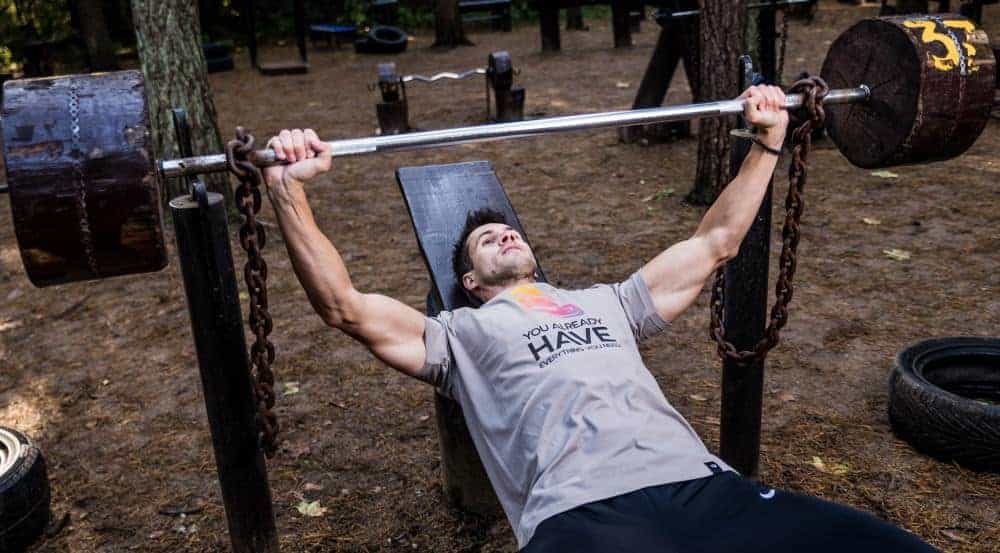Sooner or later progress will slow down and you won’t improve as fast as you used to. Performance tends to stagnate and eventually, you reach a plateau.
It’s time to open your bag of useful tricks to figure out how to overcome this frustrating phase.
One of the tools from that very bag I am talking about are supersets.
You might ask yourself: What are supersets?
No need to fear, I’ve got you covered.
Supersets is an intense and highly effective bodybuilding technique challenging your muscles in a special way.
With this technique you can save on time, get a next level pump in your muscles and most importantly stimulate growth.
Does this sound good to you? Then make sure to keep reading.
In today’s article, I’ll present everything you need to know about supersets. As a bonus I’ve included many different superset variations.
Supersets are considered a kind of miracle weapon for strength athletes. They stimulate muscle growth by extremely increasing training intensity.
One the one hand supersets eliminate breaks between the sets which saves time but on the other hand it also boosts fat burning due to your metabolism being in full swing.
As a study found, the calorie conversion was still significantly increased 24 hours after training.
This makes supersets particularly attractive for people that hold cheap on cardio.

The concept behind supersets
Basically, supersets are made up of two (or more exercises) in quick succession to boost your muscles and stimulate them to grow.
Supersets feel harder than conventional sets, that’s true.
But why is that?
Well, for the simple reason that there isn’t any rest time between the exercising following each other. Seems logical, right?
It may even get you a great pump and makes your heart rate to shoot up, but these things aren’t a powerful muscle-building stimulus.
Thus, supersets might rather more illusion than reality. Nonetheless, you can implement supersets from time to time if you want to. Nothing speaks agains that since enjoyment should always be in the foreground.
But I want to emphasize that you should not focus the core of your workout solely on supersets.
There different types of supersets, more precisely, three variations.
If the same muscles are trained with different exercises, this is called synergistic training.
If you train muscles and their opponents, we refer to it as antagonistic training.
Furthermore, supersets can also be done according to circle training. This means, you train two or more muscle groups without a break.
One of the good things about supersets is that it not only challenges your muscles but also your will.
When choosing this technique, you will have to go to your limits, but if done correctly you get highly rewarded.
To put it in a nutshell, supersets refer to the combination of two exercises.
In plain English: at the end of the first exercise, the second immediately follows and both are completed without a break in between.
Superset variations
As already mentioned, there are three different superset techniques that I want to share with you. In the following, I’ll explain each in more detail.
Synergistic superset
This form of strength training is the most commonly used variation of supersets.
So, how does it work? Shortly speaking, one muscle group is trained with different exercises immediately in succession.

This works because the respective muscles are addressed in different ways.
Since it is almost impossible to activate all muscle fibers of a certain muscle with just a single exercise, supersets facilitate the stimulation of your muscles from different angles.
As a result, it ensures that as many muscle fibers as possible get demanded.
The targeted muscle group is literally demanded to its maximum. But correspondingly, the training stimulus is very high and promotes an effective way to build muscle.
Example: bench press (heavyweight) + any flying movement variation (low weight) for chest
First, you start off doing your set of bench press and immediately after it you switch to either a pre-loaded butterfly machine or dumbbell flys.
The advantage: your muscle is maximally trained and exhausted from different angles. This leads to higher muscle fibre activation and accordingly better growth stimulus.
Especially strength athletes, who have reached a training plateau (stagnation) might find in this technique the long-awaited breakthrough.
Antagonistic superset
Every muscle has an opponent, called antagonist.
In other words, a flexor always needs an extensor.
If this wouldn’t be the case, an angled body part could never come back to its original position. And that would be rather impractical.
In the antagonistic superset, flexor and extensor are trained successively.
The advantage of this technique is its high intensity. When the activated muscle works, the opponent is actively stretched and bleed-through. The same applies vice versa.
Also, due to the lack of breaks in between each set, it leads to a high activation of the entire circulation. In turn, this also promotes weight loss, as the calorie consumption increases significantly.
In addition, the workout duration is reduced significantly, as several muscles are trained in one go.
Finally, the intermuscular coordination improves. On the one hand, the interaction of agonist and antagonist.
On the other hand, also the intramuscular coordination which reveals the interaction of the individual muscle fibers.
A 2010 review conducted by researchers from the University of Ballarat found out that antagonist supersets allowed athletes to shorten their workouts while using weights that were just as heavy (in some cases even heavier) than in traditional programs.
What’s the main point?
This method represents an effective and balanced way to prevent neglection of any opponent muscle.
To illustrate, while the biceps is being exercised, triceps gets stretched and vice versa.
In addition, the risk of overtraining is significantly lower since the individual muscle part is not as exhausted as when doing synergistic supersets.
Therefore, you can even further shorten the breaks between sets and thereby sky-rocket your metabolism.
Circuit superset
If you really want to go all in and push yourself to the limit, you can combine more than just two exercises in a row.
The intensity is correspondingly tremendously elevated and demands a lot from both your body and mind.
This superset variation is more suited for advanced athletes rather than bloody beginners.
Yet, if you’re a beginner with good overall physical condition you might also dare to use combined supersets, but obviously with less weight.
The advantage: Above all, the time savings. You can complete a full body workout in one relatively quick session.
If you also reduce the breaks between overall sets to a minimum, you stimulate your metabolism particularly strong.
For example, you could do a pair of exercises (e.g. legs and abs) three times in a row without a break and just allow yourself to rest before the next pair of exercises.
Well, you shouldn’t overdo already in the very beginning, so take it easy and increase the intensity over time.
How do supersets benefit us?
To put it shortly, you save on time, but not forfeit on muscles!
You will be able to drastically shorten your workout without cutting corners on your volume.

How is that possible? By saving half the recovery time. Thus, supersets bring along maximum effectiveness with minimum time exposure.
Furthermore, supersets work well to fully train one specific muscle group. When training chest, for example, you can do an isolation exercise first (such as flying movement) and then follow up with a heavy basic exercise (bench press).
As the triceps is involved while bench pressing, the chest muscle can be pushed to its limit.
Overview advantages of superset training:
- Very high intensity
- Fast strength improvements and efficient muscle growth
- Shorter workouts
- Intensive training enhances the cardiovascular system
- Breakthrough option at training plateaus
- Mental training to strengthen willpower
- High-calorie consumption and afterburning effect
For whom is superset training suitable?
When doing supersets, the training becomes more intense, which is especially interesting for more advanced athletes. If you’ve mastered the basics, you can fully concentrate on the intensity and completely exhaust yourself.
It is always amazing how much power a seemingly totally exhausted muscle is able to develop if one demands a different movement from it.
Is this also suitable for beginners?
Contradictory to what I’ve just said, even less experienced athletes can benefit from superset workouts. They will get a better feeling for their body and learn which muscles work with and against each other.
However, you should start with light weight and focus primarily on appropriate technique and range of motion.
Not only does this reduce the risk of injury but also promotes a better mind-muscle connection.
But for most beginners, your body is presumably not yet ready for such extreme strains. Your ability to coordinate deteriorates with increasing fatigue, making it difficult to perform the exercise properly.
Thus, give it a try if you feel ready but be careful about the intensity and start slowly.
Final thoughts – What you should pay attention to
Let’s recap the main points from today’s article.
As with any form of training, you should always make a short warm-up before entering into sweaty supersets.
Furthermore, it must be ensured that the required dumbbells or devices are free to use and pre-loaded to keep the breaks in between as short as possible.
Regarding the intensity, you should start slowly to get familiar with this training technique. It’s best to work with lower weights first and then gradually increase.
Although the muscles should be led to their limit, you should not overload them. Therefore, staying between 8-12 reps seems to be the golden middle.
How often should you implement supersets?
Well, due to the high intensity, beginners should keep it down to one superset session per week. Advanced athletes can work with 2 superset workouts.
This is mainly because the muscles need additional time for regeneration with this intense technique. If you do not give them adequate rest, sooner or later you’ll find yourself in overtraining.
In the end, this reduces your performance and power during strength training instead of getting stronger. That’s the opposite of what we want…
Moreover, you should not train with supersets all year round. Variation is important to promote new stimuli over time, which is why a period of about 6 weeks is suitable for this training technique.
Lastly, be sure to always maintain proper technique and execute correctly. It’s better to do a few reps less but with the right technique.
Especially the last reps, in which the muscles almost go to failure, are coordinatively demanding and respectively require even more attention.
I recommend to schedule all technically demanding exercises (e.g. squats, bench press, deadlifts) to the beginning of your workout.
At the end of the day, there is no way around hard and consistent workouts to build muscle mass.
For more in-depth about the optimal volume for hypertrophy, check out our complete guide!
Despite the fact that supersets save some time, you should not replace the main parts of your training with supersets.
This study shows that it is proven to be most effective in doing heavy compound exercises with “traditional sets”. You can still add supersets afterwards if you don’t want to relinquish on them.
I like them too, they’re fun to do and give you a great pump. But don’t forget, keep the main thing the main thing.
Another problem with supersets, though, is the lack of breaks in between. On the one hand, they stimulate more metabolic stress but that actually isn’t a strong muscle building factor.
On the other hand, this study shows that rest breaks about 1-2 minutes increase your performance in the upcoming set tremendously. You won’t be able to perform roughly as good as before.
Makes sense, right?. It helps to settle your heart rate and mentally prepare. Otherwise, your performance might suffer a lot in the next set.
As you can see, there certainly are benefits that speak for supersets but also comes with multiple disadvantages.
Thus, I can recommend you to implement supersets every now and then but keep your workout routine to the basics with conventional sets.
Do you implement supersets into your workouts? How frequently do you use them?
I am curious about your experience, guys. Feel free to drop a comment and share your opinion with us!
Thanks for reading, folks
Claas





6 thoughts on “Supersets – What are Supersets and How Do They Work? Complete Guide 2019”
Pingback: The Optimal Abs Volume - Hypertrophy Guide - Emerging Athlete
Pingback: The Optimal Side Delt Volume - Hypertrophy Guide - Emerging Athlete
Pingback: The Optimal Quads Volume - Hypertrophy Guide - Emerging Athlete
Pingback: The Optimal Traps Volume - Hypertrophy Guide - Emerging Athlete
Pingback: The Optimal Glutes Volume - Hypertrophy Guide - Emerging Athlete
Pingback: The Optimal Back Volume - Hypertrophy Guide - Emerging Athlete